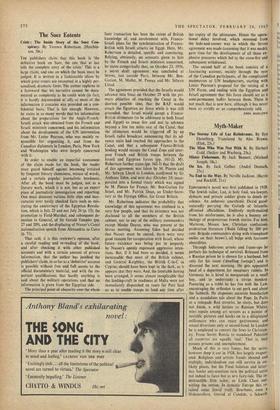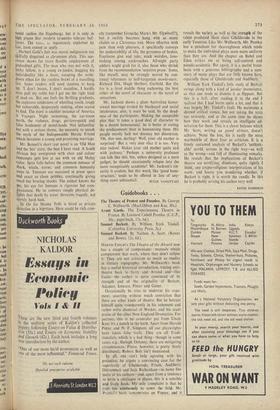Myth-Maker
The Stormy Life of Laz Roitshvantz. By Ilya Ehrenburg. Translated by Alec Brown. (Elek, 25s.) The Man Who Was Not With It. By Herbert Gold. (Seeker and Warburg, 25s.)
EHRENBURO'S novel was first published in 1928. The Jewish tailor, Laz, is holy fool, sea-lawyer, slyboots and private soldier given to dumb in- solence. An unheroic anarchistic David good- naturedly parrying the Goliath of infantile. affronted officialdom. Endlessly myth-making from his misfortunes, he is also a bouncy an- thology of preposterous Jewish stories. For him. Marxism, Mosaic law, Christian confusions, proletarian literature ('Ruin falling by 200 per cent. Brigade commanders dying with triumphant smiles on their brows'), all bulge with fearsome absurdities.
Through ludicrous arrests and frame-ups he perfects his technique of survival. Released from a Russian prison he is chosen for a husband, but only for his room ('dwelling footage) and is divorced the next morning. He gets appointed head of a department for imaginary rabbits. In Germany he is hired to masquerade as a small boy, and to understudy a circus monkey. Posturing as a rabbi he has fun with the LaW, encouraging the orthodox to eat pork and abuse the Sabbath. He dispenses accurate benediction and a scandalous tale about the Pope. In Paris, as a renegade Red terrorist, he starts, but does not finish, a wild lecture to Russian Whites, wins repute among art savants as a' painter of invisible pictures and hooks on to a dilapidated millionaire who can enjoy gastronomic and sexual diversions only at second-hand. In London he is employed to convert the Jews to Christian- ity. From Soviet Russia to mandated Palestine all countries are equally 'real.' That is, they possess prisons and unemployment.
Much of this is very funny, but the satire, however deep it cut in 1928, has largely evapor- ated. Religious and artistic frauds 'abound and multiply, individualism can still survive in un- likely places, but the Final Solution and latter- day Soviet anti-semitism turn the political satire not indeed to farce but to wry fairy-tale. The in- destructible little tailor; or Little Claus out- witting the sexton. In dynastic Europe this re- tained - some literal truth. Bourbons, even * Hohenzollern, tittered at Candide, a Schweac
could outlive the Hapsburgs, but it is only in high places that modern tyrannies tolerate buf- foons. The rul.:s, su ingeniously exploited by Laz, have ceased to apply. . .
Herbert Gold's Salt was moral indignation too skilfully disguised as chromium plate. This suc- cessor shows far more flexible employment of undoubted gifts. The man who was not with it, lucky fellow, is a young ex-junkie, hugging his Individuality like a lover, escaping the settle- down ethos for the rootless brawl of a travelling fair. Some readers will need stamina to keep up. 'I don't booze, I don't mainline, 1 hardly even pull my robin but I got me the right kind Of mad on.' But one feels the thrilling gradients, the explosive tenderness of whistling youth, tough but vulnerable, desperately seeking, often scared to find. The story is another instance of America is Voyages. Night swimming, the car-zoom north, the violence, drugs, get-love-quick and false bonhomie of motel-lands. Not unfamiliar but ,with a serious theme, the necessity to smash the myth of the Indispensable Heroic Friend Which threatens a young and promising marriage.
Mr. Bennett's short taut novel is an 'Old Man And the Sea' story, the best 1 have read. A South African boy overgrown with class and colour tontempts gets lost at sea with an old Malay sailor. Spite fails before the common menace of shark, whale, storm; and common humanity seeps in. Tensions are sustained in prose spare And exact as clean pebbles, continually giving small but bracing shocks. The author knows the 'ea, his eye for humans is rigorous but com- passionate. He so conveys simple physical de- lights that death by water threatens trage4, not merely hard luck.
In On Ice Manny Fells is hired as private detective in a birstore. Here could be rich com-
edy (remember Groucho Marx's Mr. Flywheel?), but it ,swiftly becomes hung. with as many cliches as a Christmas tree. More effective with pain than with pleasure, it specifically conveys the undesirability of life, the grossness of bodies. Footloose give and take, stock weirdies, love- making among cockroaches. All-night party addicts might grab for it, also those who shrink from the recommendation 'sensitive prose.' Some, like myself, may, be strongly moved by con- tinual references to half-forgotten movie-stars: Richard Dix, Hugh Herbert, Garfield. But On Ice is a tired middle thing eschewing the best either of the novel of character or the novel of sensations.
Mr. Jackson shows a glum Australian homo- kxual marriage eroded by blackmail and social intolerance, also, it must be said, by the dead7 ness of the participants. Making the acceptable plea 'that 'it takes a good deal of character to be a decent homosexual,' he is better at stating the predicaments than in humanising them. His people mostly lack not decency but dimension. 'Oh, that one, darling! Well, your old mother is surprised! But a very nice slice it is roo. Very nice indeed. Makes your old mother quite sick with jealousy.' Perhaps a university professor can talk like this, but, unless designed as a mere gadget, he should occasionally relapse into the more recognisably academic! Mr. Jackson's sin- cerity is evident, but this word, like 'good bone- structure,' tends to be offered in lieu of any-



































 Previous page
Previous page